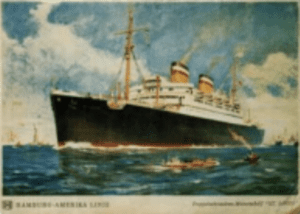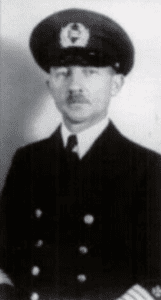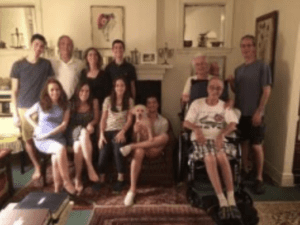
One Family’s Voyage on the St. Louis
Delivered to B’nai Jeshurun — Yom Kippur, 5776
I want to thank the Rabbis and Myriam Abramowicz for the honor of addressing this congregation for Eleh Ezkerah.
When my parents, Freya and Ludwig Maier, returned from their honeymoon in early February 1933, Hitler had been chancellor of Germany for just a few days. Starting in April of that year and continuing in the years following, a whirlwind of over 400 anti-Jewish laws were enacted by federal and state governments. For example, Jews lost the right to vote, could not hold office, could not attend public schools, and were no longer citizens.
These exclusionary decrees and legal methods of persecution affected the lives of Germany’s half million Jews, who comprised less than 1 percent of the population. Many intellectuals, professors, and physicians emigrated once they were forbidden to practice their professions. Most German Jews, however, decided to adjust to the restrictions, tolerating fear and indignities in their daily lives, and hoping the regime would eventually collapse.
What was life like before 1933? My mother grew up in a small town—Kippenheim—in the state of Baden in southwest Germany. Her grandparents, parents, aunts, uncles, cousins, and friends created and were a part of an active Jewish community. On festivals, Jews from surrounding villages attended the festivities organized by that community. The town had its own synagogue, a lovely building that was restored after WWII and is now a community center which hosts Jewish-Christian programs. An egalitarian Yom Kippur service is held there today.
Once married, my parents lived in my father’s home town—Malsch—also in Baden. As in my mother’s hometown, Jews and their Christian neighbors got along well. My father owned a business in tobacco and related products and traveled a few days a week; my mother assisted him in the business.
My parents adjusted their lives to the restrictions prescribed by the anti-Jewish laws and believed that these conditions couldn’t possibly last forever. But Kristallnacht made it absolutely clear that life in Germany was no longer tolerable.
 I was only 4 years old but I will never forget Kristallnacht. I remember Nazis barging into our house, throwing the contents of the bureau drawers to the floor, breaking crystal and dishes, and ripping open the beautiful light-green quilts in my parents’ bedroom, scattering the down feathers around the room. My most terrifying moment was seeing a photo of my father torn into many pieces. My mother held me in her arms as I cried as I thought he had died.
I was only 4 years old but I will never forget Kristallnacht. I remember Nazis barging into our house, throwing the contents of the bureau drawers to the floor, breaking crystal and dishes, and ripping open the beautiful light-green quilts in my parents’ bedroom, scattering the down feathers around the room. My most terrifying moment was seeing a photo of my father torn into many pieces. My mother held me in her arms as I cried as I thought he had died.
Earlier in the day, my father, along with the other men in town, was rounded up and incarcerated in Dachau, a concentration camp in Upper Bavaria, where he was beaten and starved for five weeks. Similar abuse was repeated throughout the country.
One of our relatives from the village received and shared information that the Cuban Immigration Secretary was selling landing permits and there was passage on the Hapag ship line. On May 13, 1939, six months after Kristallnacht, we boarded a ship called the St. Louis. My parents had decided that I would not be part of the Kindertransport to England so that the family could remain together. We traveled with my paternal grandparents and two great-aunts—a group of seven from the Maier family. The Loeb’s—my grandfather’s sister’s family—traveled as a group of nine. Seven members of that family were already in Cuba.
The St. Louis was a luxurious cruise ship. Its brochure read: “It’s a ship on which one travels securely and lives in comfort. There is everything one can wish for that makes life on board a pleasure.”
I remember its gleaming floors, wide staircases, crystal chandeliers, swimming pool, and a large dining room. For the first time I tasted bananas—pineapple. I saw dark-skinned waiters and busboys for the first time. My mother told me they were good people—they were not “Hitler’s” and that comforted me.

My parents attended a formal ball and to this day I still have the purple silk velvet gown that my mother wore. Despite the entertainment and relief of leaving Europe, there was anxiety among the passengers about starting life in a new country and sadness and concern about leaving loved ones behind.
The ship’s bells woke us up early on May 27 after two weeks at sea. We were ready to disembark to our temporary safe haven, where we would live until our quota numbers to the USA would be called. But we were in the harbor and not at dockside; our tourist landing permits had been declared invalid. A new law, Decree 937, equal to the number of passengers, required written authorization from Cuba’s Secretaries of Labor and State plus a $500 bond for each person.
I remember standing on the deck waving to people in tenders and fishing boats below us. We waved to the Loeb’s, who were already in Cuba and who were anxious to reunite with their families on the ship.
They were not reunited at that time.
Those anxious days of uncertainty and desperation weighed heavily on the adults and older children, but I was shielded and unaware. After negotiations between the Joint Distribution Committee (JDC) and Cuban officials failed, the ship was ordered out of Cuban waters. What would happen to us? Where could we go? Which country would accept us?

Had the ship had a different captain, who knows what would have happened? Throughout the voyage, Captain Gustav Schroeder’s staunch anti-Nazi position was made clear by his actions—removing Hitler’s photo from the dining room, wrapping the body of a suicide aboard ship in the shipping line’s Hapag flag rather than the Nazi flag, sailing to U.S. waters, appealing to Canada, and promising and reassuring passengers that he would not return them to Germany. Hoping that entry into the United States would be permitted, the captain sailed to the coast of Florida. He even considered running the ship aground so that England would be forced to rescue us.
Our escape to freedom had become a voyage doomed, damned, double-crossed (all titles of documentaries about the voyage). To gain time, we took a slow and circuitous route back to Europe. Fearing the worst, the captain created a suicide watch committee because of the desperation and anguish felt by the passengers.
My father joined the committee, and Captain Schroeder was thoughtful enough to write letters of gratitude to its members. The letter, which was treasured by my parents, is now displayed in my home and Captain Schroeder, was honored posthumously by Yad Vashem as a Righteous Gentile.
Finally, through the JDC’s negotiations headed by Morris Troper, Great Britain, France, Belgium, and the Netherlands agreed to accept the passengers on the St. Louis. The ship docked in Antwerp on June 17, 1939. All passengers, including my relatives the Loeb’s, disembarked and were taken by freighter to the three other countries.
The freighter Rhokatis was obviously in sharp contrast to the St. Louis. We slept on double decker cots, dormitory style; men and women were separated, and there were no activities.
 The younger members of the Loeb family arrived in the United States in May 1940. But the elder Loeb’s were eventually sent to Auschwitz, as were 254 of the passengers who were trapped because they were left on the continent.
The younger members of the Loeb family arrived in the United States in May 1940. But the elder Loeb’s were eventually sent to Auschwitz, as were 254 of the passengers who were trapped because they were left on the continent.
How was my family fortunate enough to go to England rather than to the continent? Passengers were given a preference and my parents correctly surmised that the waters between England and Germany would be protective.
We lived in Broadhurst Gardens in London in a boarding house run by Mrs. Lee, a Quaker. She taught me my first nursery rhyme in English—“Baa Baa Black Sheep”—and I always included her in the song. In order to cover some of the expenses of living there, my mother became the cook for the house. Once WW II started, air raids, shelters, and gas masks became routine. It was required to have your gas mask with you when out of doors. I did not like wearing it as it had an offensive odor.
After eight months in England, our quota numbers were called and we arrived in America on February 11, 1940. We awoke early to glimpse the Statue of Liberty as we entered New York harbor. It is a sight I will never forget.
We moved to the Bronx, where we lodged with a relative but had our meals with our aunt. With the help of HIAS, the Hebrew Immigrant Aid Society, my family soon rented our own apartment. My grandparents and an uncle lived with us for five years until my long-awaited sister was born. My mother, who had household help in Germany, became a domestic worker for a short time until her English improved and she was able to take an office job.
My father, by that time 39 years old, was a night watchman as a first job, followed by becoming a Fuller Brush salesman until he started his own business as a personal shopper. After two strokes, he passed away at the age of 52, not living long enough to enjoy his new life. My father was a gentle soul who withstood humiliation and stress.
My mother continued his business. She was devoted to her family and had strength of character and determination. Her home was open to all, and was referred to as the “Maier Restaurant and Hotel.”
She was the elegant matriarch of our family and lived to see five of her nine great grandchildren. She was interviewed for the Steven Spielberg Oral History Project. She passed away in 2003 at the age of 93. My parents’ graves are next to those of friends they met on the St. Louis and whom I regarded as surrogate grandparents.

My husband Arnold and I are blessed with a wonderful family. Our daughter and son in-law, Lisa and Aaron Leitner, have three children, and the family has made its home in Israel. My son Lawrence and his wife Stephanie and children Ethan and Arielle are members of BJ.
I owe my good fortune not only to my parents but also to the Joint Distribution Committee, which negotiated the agreement for the passengers, and to HIAS, which assisted us and other refugees. My family’s life was typical of Jewish refugees in the WWII and postwar period—we arrived penniless (the German government made sure of that). But with perseverance and a solid work ethic, we slowly integrated into American society but clung to our Jewish values. However, we were devastated that my mother’s parents were murdered in Auschwitz after suffering in Gurs and Drancy.
What happened to all the passengers on the St. Louis? It took the authors of Refuge Denied nearly 10 years to locate virtually all the passengers or their descendants. Through the efforts of one of the passengers, contacts were maintained and reunions were held.
In December 2009, my sister and I attended an unforgettable and emotional four-day reunion to commemorate the 70th anniversary of the St. Louis with 33 other passengers and their guests. It was sponsored by the generosity of Harvey Kaye, a Florida businessman who founded the National Foundation for Jewish Continuity.
A Senate Resolution was presented which acknowledged, but did not apologize for, our country’s role in forcing the ship back to Europe. And each passenger signed multiple documents, which were then presented to dignitaries and representatives of many organizations including, of course, the JDC, Yad Vashem, and the U.S. Holocaust Museum. The foundation also created the St. Louis Legacy Project. Its mission is to promote awareness of issues of human rights, immigration, and refugee policy.
In 2012 the State Department and the Legacy Project co-sponsored a special program at which a Proclamation of Gratitude was presented to the ambassadors of the four countries that admitted the passengers to acknowledge their deeds.
I recall my grandparents and the 254 passengers who were caught in the Nazi onslaught and did not survive. They and their descendants could also have built a better world just as those who did survive have done. And the 6 million? Their loss and our loss is profound.
***
Sonja Geimar had a fulfilling profession as a high-school librarian and now as an adjunct librarian. Recently, she has been involved in Witness Theater at SAR Academy, which will present its production on Yom HaShoah. Her son Lawrence Geismar and wife Stephanie Weiner have been members of BJ for over 20 years and their children had their bar/bat mitzvahs here. Sonja and her husband enjoyed BJ’s creative Purim spiels and joyful Simchat Torah services.

